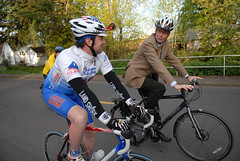“The use of cell phones is increasing so much that we have to get a handle on it now.”
— Ginny Burdick (D-Portland)
After several years of trying, the Oregon Legislature has passed a law that will make the use of cell phones while operating a motor vehicle illegal. House bill 2377, sponsored by Rep. Carolyn Tomei (D-Milwaukie), squeaked by the Senate today by a vote of 16-13 (with one excused).
That’s just one more vote than required for a bill to pass and it came down to the wire, with Senator Margaret Carter changing her vote from no to yes in the final seconds.
The vote went nearly straight down party lines, with only one Democrat, Senator Laurie Monnes Anderson from Gresham crossing over to vote against it.
The bill breezed through the House where it passed 38-22 back in April. Today, it was introduced on the floor by Senator Ginny Burdick. Burdick had sponsored a similar bill last session and told her colleagues today that, “The use of cell phones is increasing so much that we have to get a handle on it now.” She pointed out that Washington, California, and seven other states already have a cell phone ban on the books and that it’s a “reasonable thing to ask” of drivers.
Also speaking in support of the bill prior to the vote is another biking Senator, Jackie Dingfelder (D-Portland). Dingfelder said she witnessed a near miss due to a man driving with a cell phone on his ear just last night while biking in Northeast Portland.
“To single out cell phones as the only bad thing they [people] do when driving is absurd. My wife puts on makeup while driving… tell me that’s safe.”
— Jeff Kruse (R-Roseburg)
Senator Jeff Kruse, a Republican Senator from Roseburg, didn’t mince words when he said, “This is a really stupid bill.”
Saying, “This is more nanny state” and “let’s leave the people of Oregon along for God’s sake!”, Kruse urged his colleagues to vote no. Kruse feels that the existing laws on the books for distracted driving already take care of the problem. He said, “To single out cell phones as the only bad thing they [people] do when driving is absurd. My wife puts on makeup while driving… tell me that’s safe.”
Among the Republicans voting against the bill today was Senator Jason Atkinson. Atkinson is a former semi-pro roadie who has come out in support of bike bills in the past (Idaho Stop and the Fixed Gear Brake bill) and he gave a keynote speech at the Oregon Bike Summit held in Salem back in April.

owner Jay Graves during a ride
around the capitol in April.
But despite his bike-friendly credentials, Atkinson told me yesterday he wouldn’t support the bill. Why not? I asked. Atkinson said he noticed in California, after the cell phone ban passed “there were a lot of unhappy people,” that it, “ignited people against each other,” and that he hasn’t seen it accomplish what advocates have said it would.
He also said he didn’t feel he’d gotten enough support and feedback about the issue from his constituents. “We’re at the last week of session,” he said, “and I really don’t think we’re going to have the proper public input on that bill.” Atkinson continued; “Toward the end of session I get real skeptical of major policy changes when the public doesn’t get a chance to weigh in.”
As passed, HB 2377 will make the use of a “mobile communication device” while driving a primary offense, meaning cops need no other reason to pull you over (I have mistakenly reported more than once that it would only be a secondary offense). The offense will come with a $90 fine and will go into effect on January 1, 2010.
The bill provides exceptions for hand-free devices, emergency responders, CB radio operators and for people whom the operation of a motor vehicle is “necessary for the person’s job.”
Since a few amendments were made in the Senate (for CB radio operators), the bill will head back to the House for final approval and will then be signed by the Governor.
As for talking on a cell phone while biking, the bill specifically states that it applies to, “operating a motor vehicle” so unless you’ve got a motorized bicycle I assume it doesn’t apply.
Learn more about the bill, and download the full text here.

